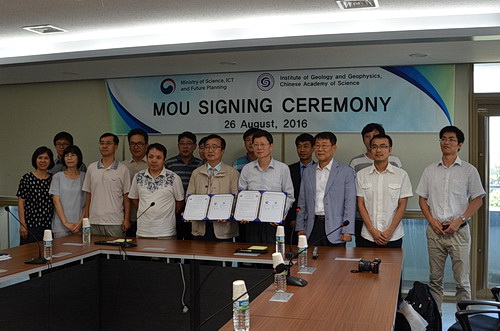|
News
|
2016
IGG and the South Korea Space Weather Center Sign a Cooperation Memorandum of Space Weather Observation ResearchIn August 2016, four researchers from IGG, including Prof. NING Baiqi, attended the Asia-Pacific Radio Conference of International Radio Union, held in Seoul, South Korea, then visited the South Korea Space Weather Center in Jeju, where they signed a memorandum of cooperation, on behalf of IGG, with South Korea Space Weather Center. Both parties plan to carry out ionospheric oblique joint detection among observation stations, and to cooperate in the development and data analysis of oblique detection technology, observation data exchange and sharing, as well as space weather research and forecasting. After the signing ceremony, relevant representatives from both parties conducted detailed discussions regarding the concrete problems of ionospheric oblique joint detection network in the first stage, such as observation models, parameter settings, time scheduling and data analysis, and determined to appoint Dr. HU Lianhuan was placed in charge of the IGG space environment detection laboratory, and plans to organize joint observation experiments in the near future. Since December 2015, during visits from South Korea and multiple discussions, both parties determined the basic framework of the cooperation in space weather observation research with ionospheric oblique joint observation as the main subject. This MOU signing marked the fact that both parties would enter the substantive operation stage of cooperation observation research. The ionospheric oblique joint detection can extend the monitoring range of IGG's space environment observatory chain, so as to obtain the ionosphere observation data in China's adjacent regions. It is of important significance to understanding the space environment characteristics of China and the surrounding areas, as well as to establishing and improving the relevant space environment forecasting models. The South Korea Space Weather Center is a specialized agency engaged in space environment monitoring and forecasting. Space environment comprehensive observatories have been established in Icheon and Jeju, South Korea, and use the same type of DPS4D ionosphere altimeter as IGG's space environment observatory chain to perform ionosphere detection. Both sides have a good foundation of ionospheric oblique joint detection.
Signing ceremony
|
-
SIMSSecondary Ion Mass Spectrometer Laboratory
-
MC-ICPMSMultiple-collector ICPMS Laboratory
-
EM & TEMElectron Microprobe and Transmission Electron Microscope Laboratory
-
SISolid Isotope Laboratory
-
StIStable Isotope Laboratory
-
RMPARock-Mineral Preparation and Analysis
-
AAH40Ar/39Ar & (U-Th)/He Laboratory
-
EMLElectron Microscopy Laboratory
-
USCLUranium Series Chronology Laboratory
-
SASeismic Array Laboratory
-
SEELaboratory of Space Environment Exploration Laboratory
-
PGPaleomagnetism and Geochronology Laboratory
-
BioMNSFrance-China Bio-mineralization and Nano-structure Laboratory


